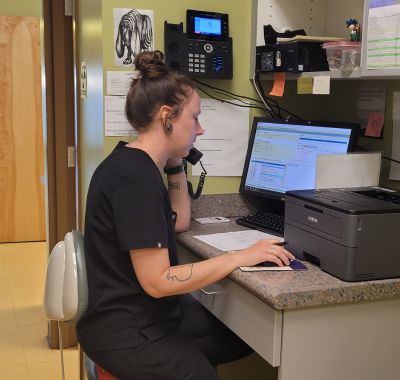Pinnacle Animal HospitalFAQS
There is no question too big or too small for our veterinary team. Below are some answers to our most common questions.

We Proudly Serve The Pets Of Arden, Nc, And Beyond.
At Pinnacle Animal Hospital, we get a ton of interesting questions from pet parents. Below are some common FAQs that might help answer any questions or concerns. Please feel free to call us at 828-676-2332 for any other concerns you might have about your pet.
Is the anesthesia safe?
Today’s modern anesthetic monitors have made surgery much safer than in the past. Here at Pinnacle Animal Hospital, we do a thorough physical exam on your pet before administering anesthetics to ensure that a fever or other illness won’t be a problem. We also adjust the dose and type of anesthetic used depending on the health of your pet.
Preanesthetic blood testing is important in reducing the risk of anesthesia. Even apparently healthy animals can have serious organ system problems that cannot be detected without blood testing. If there is a problem, it is much better to find it before it causes anesthetic or surgical complications. Animals that have minor dysfunction will handle the anesthetic better as all patients receive IV fluids during surgery. If serious problems are detected, surgery can be postponed until the problem is corrected.
It is important that surgery be done on an empty stomach to reduce the risk of vomiting during and after anesthesia. You will need to withhold food for at least 8 to 10 hours before surgery. Water can be left down for the pet until the morning of surgery.
Will my pet have stitches?
For many surgeries, we use absorbable sutures underneath the skin. These will dissolve on their own and do not need to be removed later. With any type of suture, you will need to keep an eye on the incision for swelling or discharge. Most dogs and cats do not lick excessively or chew at the incision, but this is an occasional problem you will also need to watch for. If there are skin sutures, these will usually be removed 10 to 14 days after surgery. You will also need to limit your pet’s activity level for a time, and no baths are allowed for the first ten days after surgery.
Will my pet be in pain?
Anything that causes pain in people can be expected to cause pain in animals. Pain medications needed will depend on the surgery performed. Major procedures require more pain relief than things like minor lacerations.
What other decisions do I need to make?
While your pet is under anesthesia, it is the ideal time to perform other minor procedures, such as ear cleaning, or implanting an identification microchip. If you would like an estimate for these extra services, please call ahead of time. This is especially important if the person dropping the pet off for surgery is not the primary decision-maker for the pet’s care.
When you bring your pet in for surgery, we will need 5 to 10 minutes of time to fill out paperwork and make decisions on the blood testing and other options available. When you pick up your pet after surgery, you can also plan to spend about 10 minutes going over your pet’s home care needs.
We will call you the night before your scheduled surgery appointment to confirm the time you will be dropping your pet off and to answer any questions you might have. In the meantime, please don’t hesitate to call us with any questions about your pet’s health or surgery.
